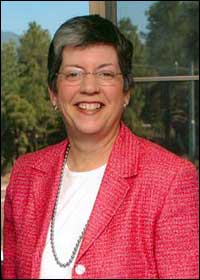Gov. Janet Napolitano has thrown her support toward plans by Northern Arizona University to expand its health professions offerings.
During her State of the State address Jan. 8, Napolitano said her proposed budget, which is scheduled to be released Jan. 12, will include funding for the medical school in downtown Phoenix.
The new funding will allow the state to tie in the medical school with “key biomedical research and education initiatives,” such as NAU’s allied health programs, she said.
“Last year I spoke to you about the need to increase the number of doctors and nurses working in Arizona,” the governor said. “The problem remains acute, particularly in the rural parts of our state.”
The Arizona Board of Regents already has approved NAU’s plans to expand existing health professions programs, including the physical therapy program on the Flagstaff campus and moving the doctorate in physical therapy to Phoenix. NAU also will extend its dental hygiene program to Phoenix and anticipates expansion of the nursing program in Tucson, Prescott and Yuma.
“This health professions expansion initiative meets the public agenda and an extraordinary state need,” said NAU President John Haeger, who noted the university had to turn away more than 500 students last year because of lack of space in existing health professions programs.
In addition, the regents approved NAU’s 2007-08 state budget request, which includes $4 million to establish potential new programs in occupational therapy, physician assistant, human biology and lab science technology. The university also is looking at bringing its entry-level physical therapy program to Phoenix.
Haeger said the expansion of health professions programs will complement the medical and health program degrees offered by the University of Arizona and Arizona State University and the new UA College of Medicine in Phoenix.
During her address, Napolitano also echoed Haeger’s earlier call for holding universities more accountable for student success.
“Our universities must continue to increase the number of graduates, especially in areas we need most: teachers, health care professionals, engineers, researchers-the list goes on,” she said.
Toward that goal, Napolitano said she will propose the highest-ever general fund contribution to state financial aid.
Haeger said in October that NAU faces national scrutiny over such issues as competitiveness, affordability, accessibility and accountability.
Haeger explained that NAU must foster a culture of a bold, forward-looking university that is responsive and not passive. “We must convince the public and state we are worth the investment,” Haeger said.
Instead of going hat in hand to the Legislature, NAU must perform on a level that demonstrates its significance to students and to society.
“People like to support winners not people who are whining,” Haeger said. “We’re a winner. We need to take it out to the state.”



